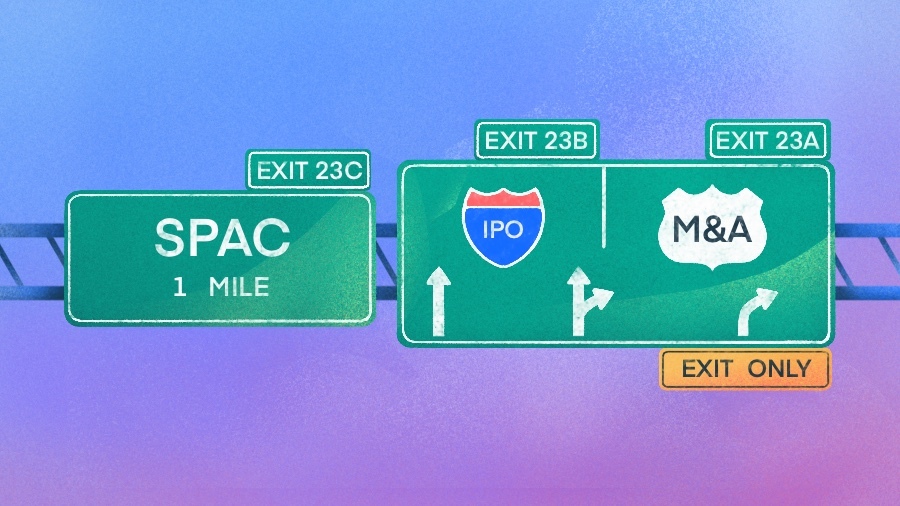After nearly two years, the tech IPO market may finally be reawakening, setting the stage for a broader rebound in 2024.
Two expected IPOs in particular will be closely watched by the long backlog of heavily-funded startups waiting in the wings to make their market debuts: Arm Holdings and Instacart.
The performance of the two very different highly valued and well-branded companies — Arm, which benefits from the demand for processing power for AI, and Instacart, a grocery delivery service that experienced high growth during the pandemic — will be a test of investor appetite for the next wave of technology IPOs.
While those IPOs could rejuvenate a stagnant market, the bar is also much higher now for startups hoping to ascend to the public markets than it was a mere two years ago, when more than 350 venture-backed companies went public in the U.S.
Investors are asking “are these companies ones that could actually become profitable, or are they companies that continuously need additional capital injection?” according to Ran Ben-Tzur, a partner at law firm Fenwick & West who advises technology and life sciences companies planning to list on the public markets.
So far this year, there have been just 43 IPOs for U.S. venture-backed startups. More than 1,400 companies that have collectively raised close to $900 billion from private investors remain on The Crunchbase Unicorn Board, a global list of private startups valued at $1 billion or more.
IPO pipeline thaw?
Many large tech unicorns including Stripe and Reddit filed IPO plans in 2021 but missed the window when the tech stock market dropped the following year.
Arm and Instacart — along with several other possible 2023 debuts including marketing email automation company Klaviyo — could prompt some of those startups to dust off their IPO plans too.
Arm’s Nasdaq listing is expected to be the largest IPO since Rivian’s public debut in late 2021. The SoftBank-owned chip designer filed its IPO prospectus on Monday and is reportedly aiming for a listing valuation of between $60 billion and $70 billion.
But perhaps more relevant for the startup world is Instacart’s expected IPO. The grocery delivery company, last valued by venture investors at $39 billion in 2021, is also predicted to file its IPO plans this week for a September debut.
Now more than a decade old, Instacart is one of the better known technology companies to face the public markets since 2021. It’s one of the 10 largest private unicorn companies based on its 2021 valuation, (though its more recent internal valuation, reportedly slashed to $13 billion, is a more accurate indicator of its current value as it prepares to file).
Instacart’s valuation reset is also indicative of the reality check facing many heavily funded startups in the aftermath of 2021’s bull run.
“Amongst our client base we are seeing companies doing down rounds, or liquidating or doing fire sales. So I think there will be a lot of fallout,” said Ben-Tzur, whose company also advises on private funding and M&A. “There’ll be a lot of companies that might have been viable IPO companies a couple of years ago that just aren’t in today’s market, and they’ll need to sort of figure out what their next step is,” he said.
While investors don’t necessarily expect profitability at IPO, companies should plan to show net income within six quarters of a listing, he said: “You’ll see companies even sacrificing some growth to show profitability.”
Mark to market
Ben-Tzur worked on a number of public listings during the 2021 IPO market peak, including Coinbase, GitLab and SentinelOne — all of which are currently trading below their IPO price amid a general market slump for newer public companies.
A Crunchbase News analysis shows that roughly 60% of 2021’s billion-dollar listings in the U.S. are now valued below $1 billion. Things look even worse for last year’s IPOs: 78% of 2022’s billion-dollar listings are currently valued below $1 billion.
The market would be more receptive toward new issuances if the 2021 cohort were valued closer to their debut valuations, according to Ben-Tzur. “They are trading well above their lows but not anywhere near their highs at the moment.”
Companies that will list first “have spent the last 24 months right-sizing their business and focusing on the right KPIs that public market investors would likely focus on,” said Larry Aschebrook, managing partner of Chicago-based G Squared, a growth investor with $5 billion under management.
Car-sharing marketplace company Turo, one of G Squared’s portfolio companies, filed IPO plans in early 2022, but has not yet announced when it plans to go public.
Ultimately, each company that goes public is a test of current market values. Just as a blockbuster debut can breathe new life into the market, a highly anticipated stock that falters can torpedo it.
Back in 2012, Facebook “had a very rocky introduction to the markets, and that really actually impacted the entire market for a period of a good six to nine months,” said Ben-Tzur, who worked on the social media company’s IPO early in his career.
Startups as well as public and private investors are again unsure what the current climate is, Aschebrook said. “You need a few brave folks to test the market.”
Search less. Close more.
Grow your revenue with all-in-one prospecting solutions powered by the leader in private-company data.
Illustration: Dom Guzman

Stay up to date with recent funding rounds, acquisitions, and more with the Crunchbase Daily.






![Illustration of Harris and Trump: 2024 presidential election candidates. [Dom Guzman]](https://news.crunchbase.com/wp-content/uploads/Election-2024-300x168.jpg)

![Cybersecurity illustration with shield, books, laptop. [Dom Guzman]](https://news.crunchbase.com/wp-content/uploads/Cybersecurity_Shield-300x168.jpg)
67.1K Followers